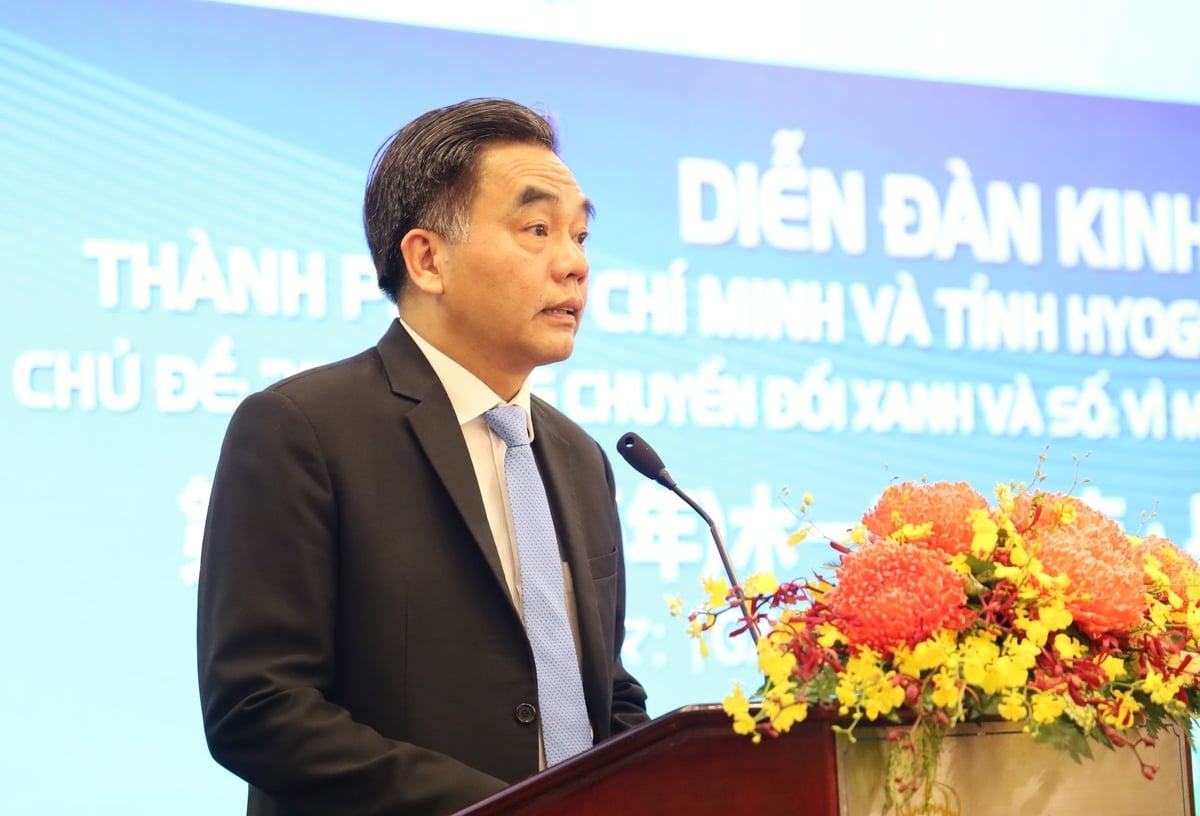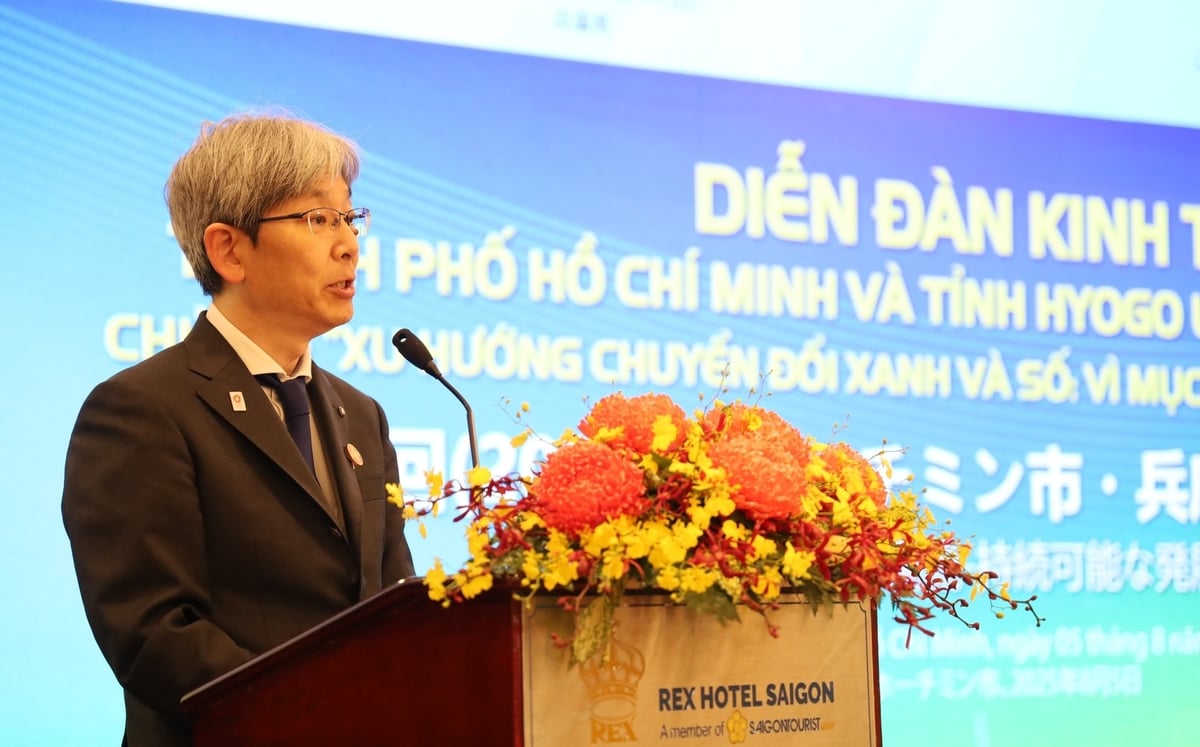October 24, 2025 | 03:36 GMT +7
October 24, 2025 | 03:36 GMT +7
Hotline: 0913.378.918
October 24, 2025 | 03:36 GMT +7
Hotline: 0913.378.918
Speaking at the 7th Ho Chi Minh City - Hyogo (Japan) Economic Forum, Mr. Nguyen Loc Ha, Vice Chairman of the Ho Chi Minh City People's Committee, affirmed that the city regards digital transformation and green transition as strategic choices and key drivers for sustainable development. Accordingly, Ho Chi Minh City is implementing a green development strategic framework through 2030, with a vision toward 2050. The city aims to reduce greenhouse gas emissions by at least 10% by 2030 and move toward net-zero emissions by 2050.
The Ho Chi Minh City - Hyogo Province Economic Forum 2025 takes place in the context of profound global geopolitical and economic shifts, as well as ongoing major environmental and climate challenges.

Mr. Nguyen Loc Ha, Vice Chairman of the Ho Chi Minh City People’s Committee, emphasized that digital transformation and green transition are the core driving forces for achieving sustainable development. Photo: Phu Quoc.
As part of this strategy, agriculture and environmental technology have been identified as two key sectors in need of transformation. In peri-urban districts such as Can Gio, Cu Chi, and Nha Be, areas still rich in agricultural potential, Ho Chi Minh City is actively promoting ecological farming models. These models integrate the protection of mangrove ecosystems with sustainable aquaculture practices and the reduction of chemical agricultural inputs.
Specifically in Can Gio District, the city aims to develop the area into a model green urban zone. One flagship initiative is the implementation of a mangrove forest carbon stock assessment program to enable participation in the global carbon market. This not only serves as a climate change adaptation model but also marks a crucial step in converting ecological resources into economic assets.
On the international cooperation front, Mr. Hattori Yohei, Vice Governor of Hyogo Prefecture, expressed strong appreciation for Ho Chi Minh City’s comprehensive green development orientation, particularly in agriculture and environmental technology. According to Mr. Hattori, Hyogo is currently one of Japan’s pioneering provinces in the development of hydrogen energy, industrial waste treatment, household waste recycling, and water-saving technologies in agriculture. These advanced solutions, he noted, are highly applicable to Vietnamese localities that are now entering a critical phase of green transition and climate adaptation.

Mr. Hattori Yohei - Vice Governor of Hyogo Prefecture - believes that Ho Chi Minh City and Hyogo have great potential for cooperation in green workforce training. Photo: Phu Quoc.
Mr. Hattori particularly emphasized the importance of strengthening cooperation in training a green workforce, identifying high-tech agriculture as a strategic priority. Hyogo Prefecture is currently promoting programs that connect Vietnamese students with Japanese companies in the environmental technology sector, while also developing support systems that enable foreign workers to build long-term careers in a respectful, well-supported working environment.
According to Mr. Pham Binh An, Deputy Director of the Ho Chi Minh City Institute for Development Studies, the city is conducting a comprehensive assessment of emissions levels across different sectors and industries in order to establish a priority list for green transformation. In the agricultural sector, the city is pursuing a low-emissions strategy based on organic farming, circular agriculture, and the integration of water-saving irrigation technologies, the use of bio-fertilizers, and the conversion of agricultural by-products into energy or organic fertilizer.
“We are also exploring the development of ‘green villages'. The model combines agriculture, eco-tourism, and renewable energy in peri-urban areas. These are initiatives that Ho Chi Minh City is ready to share and collaborate on with Hyogo,” Mr. An stated.
In terms of vision, Ho Chi Minh City aims to become a leading regional and international hub for the economy, finance, services, trade, logistics, high-tech industry, and marine tourism. Digital transformation, green transition, and innovation lie at the foundation and driving force of development.
Japan is currently the third-largest investor in Ho Chi Minh City, with over 2,200 active projects. Among these, sectors related to the environment, green urban development, and high-tech agriculture are being strongly promoted especially in the context of the city’s recent announcement of a portfolio of more than 80 projects calling for investment following the administrative boundary consolidation.
The cooperation allows both sides to have more opportunities to expand, especially in pioneering fields such as the digital economy, green economy, circular economy, knowledge-based economy, renewable energy, and industrial upgrading.
Translated by Kieu Chi
/2025/10/23/5928-2-194850_964.jpg)
(VAN) The 'Regenerative cocoa production to support livelihood development in Vietnam' (ReCoPro) project marks an important step toward sustainable cocoa production.

(VAN) Reducing antibiotic dependence in livestock production helps protect public health, enhance food safety, and promote sustainable agricultural development.

(VAN) Experts describe Viet Nam as a 'policy laboratory' within ASEAN, where new agroecological, green finance, and risk-management initiatives are being piloted before wider regional adoption.

(VAN) Limiting rice straw burning and reusing agricultural by-products as materials or fertilizers not only improves soil health but also helps clean the air.

(VAN) ASSET delivers long-term vision and strategy, innovative models, learning networks, policy impact, and measurable environmental benefits.
/2025/10/21/1634-2-111000_41.jpg)
(VAN) A working delegation led by Vice Chairman of the Ho Chi Minh City People's Committee Bui Minh Thanh inspected fishing ports and assessed fishing vessel management work ahead of the EC inspection.

(VAN) Promoting digital transformation in irrigation is to enable early forecasting, modernize management of infrastructure, and enhance production efficiency at all levels.